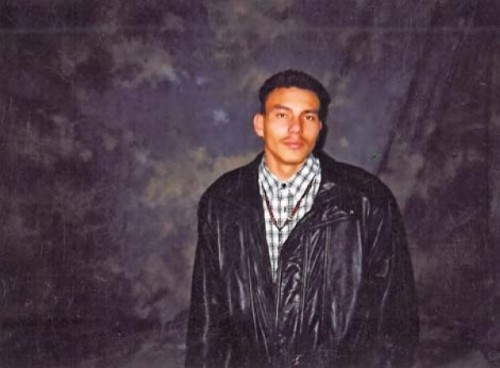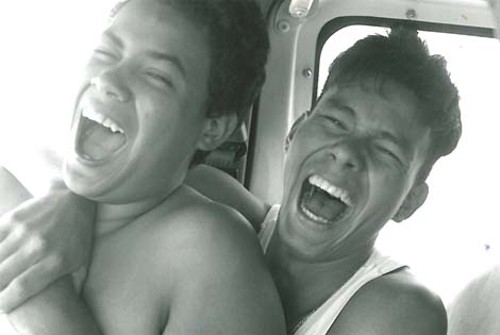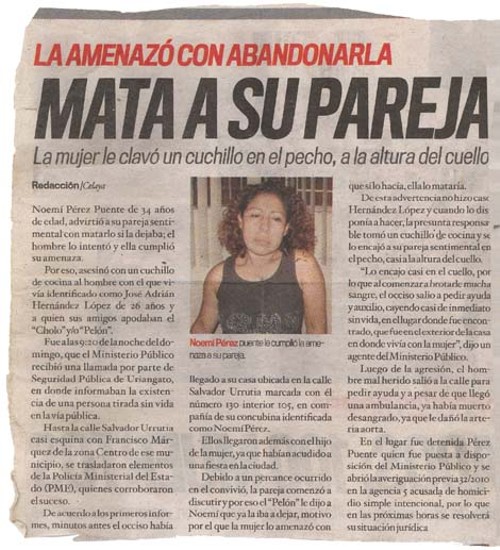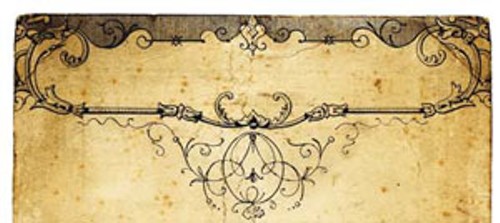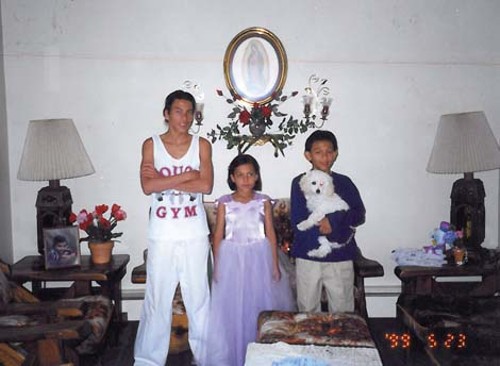Dead End
The one life anti-gang activist Jose Hernandez couldn’t save was his own.
By Stephen Dark @stephenpdarkAs the final seconds of Jose Hernandez’s life trickled out with his blood as he lay on the ground in Mexico, his last thoughts may well have been of Utah. He had just told his girlfriend he was leaving her and returning to Utah before she cut his throat. Utah was where Jose and his mother, Maria, brother Miguel and sister Gloria came to settle illegally when he was 10 years old. The west valley of Salt Lake County was where he would do most of his growing up in gangs, in detention and finally in county lock up. Utah was where Jose’s mother would stunningly walk out on him and his siblings, and from where Jose would be deported twice by the time he was 26.
Utah was also the place where Jose had met, through the Boys & Girls Clubs, 66-year-old Walt Hunter, one of a few caring souls who took an interest in Jose and tried to steer him clear of gangs. Salt Lake City was where Jose discovered the cathartic release of poetry and the spoken word. It was here Jose’s school counselors began to see a change in the gangbanger and believed he might escape the clutch of gang life. Jose began speaking out against gangs and, for this trouble, was eventually jumped by four inmates in his cell in the Weber County Correctional Facility in Ogden after one called the then 23-year-old a “punk bitch,” and lured him into a fight.
According to a prison report about the attack on Aug. 14, 2007, one of the assailants “shanked [Jose] in the nose with a pencil” in an attempt to pierce his brain. Blinded by blood, Jose shrugged off his attackers, pulled out the pencil and staggered to a bathroom to wash the blood from his eyes. His assailants fled when Jose’s “homies” came in from a game of handball in the recreation yard.
The four attackers, also gang members, had keyed in on Jose because he was giving twice-weekly poetry workshops at the prison to encourage young gang members to leave gang life. “I can’t think of a more dangerous place to conduct impromptu gang-prevention classes,” Hunter says.
Jose was transported to a hospital “due to the severity of his injuries,” according to the report, and a doctor removed a piece of graphite close to his brain. When Hunter visited Jose, the hospital room was only dimly lit. The young man lurched up from his bed, his hands reaching for his friend as he pleaded with him, “Tell me what I look like.” The young man’s face was grotesquely swollen with blue-green contusions, Hunter recalls.
Being undocumented with a rap sheet put roadblocks in front of Jose’s attempts to build a life in a country he had come to realize did not want him. How his life slipped through the cracks of an, at best, indifferent system is not a surprise to the many who knew him. But for the many who loved him, his death marks the loss of, as Hunter says, “an ambassador for these kids who have no voice.”
NO COUNTRY
Jose once told Hunter, “I’m not an alien. I’m not illegal. They don’t accept me here. They don’t want me in Mexico. What I am is a kid without a country.” Hunter says Hispanic parents bring their children illegally to the United States at an age “when the kids don’t have a choice. Then, after being allowed to participate through high school, after seeing other kids living the American dream, suddenly, when they turn 18, all support ceases.”
In 2004, Jose made a five-minute video to raise funds for a documentary about his life. In it, he made several claims—notably that he went to prison as a minor—that are questionable. Yet his life hardly needed dramatizing. Beaten at age 14 into joining La Raza, one of a number of local versions of California and Chicago gangs that now operate in Salt Lake City, he risked his life to later leave the gang and work with at-risk kids to steer them away from gangs. He struggled with feelings of abandonment after his mother abruptly walked out, feelings that Sonia Orozco, a gang-prevention officer at Jordan School District who worked with him, says are all too prevalent among undocumented teens. “There are so many Joses out there, who are thrown away like trash by their parents,” Orozco says. “And then these kids turn to what they can find to survive—gangs, drugs, life on the streets.”
Anti-gang activists, artists, counselors, friends and family and describe Jose as a charismatic, natural leader. His former therapist, Gabriela Cetrola, says that Jose often talked about his criminal past to hundreds of children in classes and social clubs throughout the Salt Lake valley to dissuade them from following in his footsteps. “I always wondered about him, where he was,” Orozco says, in tears, upon learning of his murder. “Nobody cares for these kids.”
Jose is also never far from Walt Hunter’s thoughts. Jose shared a dream with him in which he and Hunter were standing on a second-floor balcony of a club they’d created for at-risk kids. “It’s our place, it’s for kids without a country,” Jose said of his dream. “We made it, Walt. It’s going to happen.” Hunter says that despite the death of the young man he mentored, opening a club for kids like Jose “is still a goal for me. I cannot believe how these kids exist, under the circumstances they do, the totally hopeless situation, and yet they still have hope. How does that happen?”
MOMMIE DEAREST
Jose was born on March 5, 1984, in Uriangato, Guanajuato, Mexico, to Maria and Gabriel Lopez. Relatives say that Jose’s parents fought bitterly, to the point where his mother decided to leave her husband for the United States. She secured false papers for herself and two of her children, Miguel, then 6, and Gloria, age 3. Lopez hired a “coyote” to guide her older son, Jose, then 10, across the border and meet them at a McDonald’s in Nogales, Texas. The first time Jose tried, he almost drowned, he told Hunter. The second time, border patrol agents arrested his coyote. The third time, he made it across, alone.
Gabriel Lopez pursued his wife and children to Salt Lake City, where Jose’s grandmother had taken up legal residency several years earlier. He moved in with his wife and children, although both Miguel and Gloria acknowledge their mother was abused by their father. A year after Gabriel moved in, his wife abruptly left, moving in with an employee at a restaurant where she worked.
Cetrola says Jose “grew up by himself,” and found in La Raza a family. He was jumped in to La Raza at the age of 12 because, Miguel says, he needed a place “to show his strength, his anger, his sadness.” But “Chuy,” an undocumented former gang member and friend of Jose’s, says joining a gang is sometimes the only choice available. When Chuy was 12, his mother was deported. His brothers told him unless he “worked,” he would be sent back to Mexico, which he had left as an infant. He joined a gang and made money by dealing drugs, which allowed him to pay rent to his siblings. “Sometimes [gangs] are not the best choices, they are just the ones you have,” Chuy says.
Jose attended Eisenhower Junior High School in Taylorsville, where he was infamous for carrying around an attaché briefcase that he later claimed contained drugs, money and a handgun. Gloria would come home from elementary school and find paraphernalia in the house or Jose using drugs.
Eisenhower’s resource aide, Cristine Spendlove, met Jose when he was in a reading program in seventh grade. One day, Jose came to school sobbing because he had run into his estranged mother on the street and she had refused to acknowledge him. Spendlove says that was when she saw the real Jose. “He was so lost, he was just trying to fit in.”
Jose was eventually expelled from Eisenhower, although whether because he was high, selling drugs or threatening a teacher isn’t clear.
In December 1999, Jose, then 15, and three other youths were charged with kidnapping a teenage girl and sexually assaulting her in a van before releasing her. He was sent to a detention facility, although it is unknown for how long. It was a crime that therapist Cetrola says Jose was remorseful about and one for which, in his subsequent evolution into an anti-gang activist, he sought redemption.
In a notebook, Jose wrote about his life as an incarcerated minor. The only place he could let his fear show was in the showers, where he would “start crying so they wouldn’t see me crying because of the water.” He later shared this story during gang-prevention lectures at a local junior high.
Miguel saw his older brother grow up into two men: One was Jose, who loved his family; the other was Flaco [the thin man], whose features were a mask that revealed no emotion. Incarceration, Miguel says, helped Jose make sense of things, to understand that he was, “all alone, in the belly of the beast.”
Jose also put his feelings into poetry, an art form Hunter introduced him to in 2001 when they met at a poetry workshop given by the at-risk youth counselor at Valley Mental Health’s Adolescent Residential Treatment and Education Center [ARTEC], a locked-down transition program for youths getting out of incarceration.
“Poetry is the truth,” Hunter told Jose. “Write the truth, and you’ll end up with a poem.” Jose’s truth, his first poem, was “I Stand Alone.” Matt Bradley, a former SpyHop manager who encouraged Jose’s artistic ambitions, says he “poured his heart into his poetry, all his hopes and dreams.”
BROTHERLY LOVE
In late 2001, Jose was released from ARTEC. On one of his first visits to the Midvale club of the Boys & Girls Clubs of South Valley, where Hunter worked, he brought a sheaf of poems. But he was accompanied by some other men who were clearly armed and protecting him.
Hunter told Jose he had to change his ways before he could help, or get help, at the club. Jose obliged and soon became a regular at the club where “he had the same face, only more humor; more Jose, less Flaco,” Miguel says.
Jose went to Denver and was about to conclude a $25,000 drug deal when, Hunter says, Jose heard a “voice” telling him to abandon drugs and help other kids get out of gangs. Jose believed God had given him an “assignment.”
Penniless, he returned to Midvale and approached Hunter outside the club one evening. “He didn’t want to come in,” Hunter recalls. “He was embarrassed he looked like a homeless person.” Jose told him about his assignment, then opened his empty wallet and showed him, in the driver’s license pouch, that first poem he had written. “This is the most important thing that ever happened to me,” he said. “I wanted to thank you.”
Jose’s mission was crystallized by his decision to leave La Raza. Chuy says Jose mentored the younger brother of the gang’s leader and advised him to not join the gang. His message to would-be gang members was simple, Miguel says. If they wanted to “bang in this life, they might have to do things they didn’t want to,” whether hurting others, or being hurt themselves. Other gang members, who wanted the gang to grow, quickly took offense. “Jose told the gang he was going to leave, that he was spreading the message,” against gang life, Chuy recalls. Hunter says Jose faced death threats from the gang in the wake of his decision to leave.
Jose “was hungry for this mission of his,” Hunter says, and quickly became “a poster child” for the Boys & Girls Clubs. He performed “I Stand Alone” for U.S. Rep. Jim Matheson, D-Utah, for a club fundraiser in 2003. He and Hunter visited many schools, including Eisenhower Junior High, where he spoke on gang prevention to a skills-for-life class run by Cristine Spendlove. Jose seemed mature, Spendlove says, and brought a message of hope: “For all the mistakes he had made, he told the children there was hope for them, they didn’t have to live like he did.”
If Jose had success persuading Hispanic kids from going into gangs, he failed with his younger brother. At a junior high school, Miguel met several Crazy Ass Mexican gang members. When he hung with the CAM guys, Miguel says, “I liked how they showed brotherly love.” He told Jose that he wanted to get jumped in to CAM. Jose took him outside. “Let’s see if you’re ready to bang,” he said. Jose was a good fighter, Miguel recalls, and “beat the shit out of me.” It wasn’t enough to dissuade him. By taking his brother’s beating, “I let him know I was down for my gang.”
BROKEN HEART
From the spring of 2002 on, Hunter and an intensely committed Jose formed an odd Batman-and-Robin duo of the at-risk counseling world. Hunter took Jose to a women’s shelter where Hunter had experienced difficulty communicating with the women and found that Jose, to his surprise, connected with them to such an extent that they requested that he return for subsequent visits.
Jose would constantly push Hunter to visit more schools and reach out to dignitaries and the well connected, with Jose reading his poetry at a national Hispanic chamber of commerce dinner and a host of other such black-tie events.
But the heart of Jose’s work was talking with young undocumented teens who saw gang life as a replacement for their impoverished family situations and offering them, through poetry and his own experiences, a different path to walk down.
My Prayer |
It seemed a natural combination, then, when in early November 2003, the Boys & Girls Clubs offered Jose part-time work through a Department of Workforce Services program. He did two weeks’ work, Cetrola says, but then had trouble producing a Social Security number. Despite Cetrola fighting for Jose, he was never paid for the two weeks. “He felt devastated,” she says. He nevertheless filled in papers to be a Boys & Girls Clubs volunteer, only to be denied. Boys & Girls Clubs Director Bob Dunn says he doesn’t remember why, but points to Jose’s criminal record. When Hunter told Jose he’d been rejected as a volunteer, “he just melted and went into convulsive tears.” The work he did at the club with at-risk youth meant everything to Jose, Hunter says. “It was his antidote to drugs, to being in gangs.” His desperation, Cetrola says, led to suicidal impulses that she worked with him on during counseling.
That rejection, Miguel says, led Jose to start “messing up again. He tried to do something positive and they told him no. He was mad, sad. He was Flaco again.”
Jose hoped his short video he made in 2004 could raise money to make a documentary about his life. “He wanted to help people understand what the challenges and situation was being from Mexico but not necessarily being accepted here,” says former SpyHop manager Matt Bradley, who worked with Jose on the film.
By the summer of 2005, Jose had secured funding for his film project and was living with an older woman and her children. On July 23, 2005, the woman called the police, alleging Jose had tried to kill her with a knife. He was arrested, but a month later, the two assault charges were dismissed due to “witness problems,” according to court documents.
When Hunter went to pick Jose up from jail, he found out immigration officials were deporting him to Tijuana. He saw Jose shortly before he was flown out and gave him the few dollars he had in his pocket. Jose came out in leg irons, the smell of an outhouse wafting behind him from the room where the deportees were being warehoused. Hunter saw “a defeated kid. I wanted to give him a hug,” but he wasn’t allowed to touch him.
A year and a half later, Jose miraculously returned to the States and was back “in the Lake,” Miguel says. One night, there was a knock at the door. When Miguel opened the door and saw his brother, “It wasn’t difficult to see he’d done more shit,” Miguel says.
Jose told Hunter he had promised to pay a “coyote” for guiding him across the border to Arizona, but once they got to the United States, told his guide he had no money. “They put a gun to his head,” Hunter says, but Jose convinced the human smugglers to let him work off the debt by aiding the guides as they brought more people over.
A few months after Jose returned to Utah, the police busted down the apartment door in search of Miguel. Instead, they found Jose and a .22 rifle he told Hunter belonged to a relative. Rather than have the relative go to jail, Jose told the police it was his weapon. Jose was charged with possession of a firearm by an illegal alien and pleaded guilty on Dec. 19, 2006, in federal court and was sentenced to 11 months detention.
Hunter went to see Jose on Sundays in Weber County Correctional Facility in Ogden. “He was doing gang prevention in prison,” Hunter recalls. “All these young gangbangers were looking for some kind of attention.” Behind the visiting room glass, Jose introduced other inmates to Hunter so he could help them when they got out.
Facing his second deportation, Jose doubted he would make it back to Utah again. He wrote Hunter from the Weber jail: “I’m not having a good feeling this time about coming back through the border, I’m not afraid of death but I’m afraid I won’t be able to see you anymore. That’s my worst fear.”
A chained Jose shuffled off the plane in Tijuana, Mexico, with a few hundred dollars. Tijuana police, he told Hunter, stopped him minutes after he left the airport and stole his money.
Several weeks after Jose was deported, Hunter received his effects from the prison. Among them were three extraordinarily delicate rosaries Jose had fashioned using underwear elastic.
In April 2010, Art Access II gallery exhibited one of the rosaries as part of an exhibition called Outside Is In, which celebrated Outsider art. Art Access’ executive director Ruth Lubbers says, “There was something so human and so emotional in Hernandez’s art, you couldn’t help but be touched by it.”
BEAUTIFUL LIFE
Before Jose was deported, he wrote to his sister that their mother “left for a reason,” Gloria says. “He didn’t want me to keep that hate within me. He had learned to get over it.”
Indeed, therapist Cetrola believes that Jose found “a new purpose, something to keep him alive” after his second deportation: a quest to find his mother. After weeks of homelessness in Tijuana, a near-starving Jose traveled to his hometown of Uriangato, where, Cetrola says, he lived close to the woman who had abandoned him, something “he had been longing for since he was a kid.”
On April 2, 2010, Hunter gave a sparsely attended lecture at Weber State University titled “Kids Without a Country.” He concluded that poetry had saved Jose’s life from gangs and drugs. “In turn, that saved hundreds of gang-affiliated kids from a life of crime and violence.”
A month later in Uriangato, Jose’s efforts to reconcile with his mother took a tragic turn. Now 26, he was living with 34-year-old Noemi Perez Puente, but he planned to return to the United States. He had found little work in Mexico, his sister says. On Sunday night, May 9, 2010, after returning from a party, Jose told Perez he was leaving her. She responded that if he abandoned her, she would kill him.
Jose ignored her threat and she stabbed him in the throat with a kitchen knife. He stumbled out to the street for help but fell down close to the house and bled to death. Puente was incarcerated, but for how long is unclear.
| I Stand Alone
I stand alone in this world -Jose Hernandez |
“All he wanted was to be loved,” says Jordan School District’s Sonia Orozco. “All he wanted was for people to believe in him.”
Hunter still works with youths he met through the Boys & Girls Club and still yearns to fulfill Jose’s dream of a clubhouse for undocumented youth. On Sundays, he attends Mexican soccer leagues to catch up with his former club students. “There’s a sense of finality now,” he says. With the anti-immigration fervor that has gripped Utah in the last few years, “the world is just collapsing upon these kids right now. It’s the end of their dream” of finding a home in the country they were brought to but that no longer wants them. “They are part of our society,” says Cetrola, who expresses genuine fear for the future of this generation of undocumented teens growing up in the face of such overt social hostility. “We face the same choice we have with other marginalized populations. Do we build bigger fences or share what we have?”
Miguel still sees kids Jose helped keep out of gang life. “They’re not banging,” he says. Instead, they’re wearing reggaeton clothing, casual clothes; “just normal,” he says. Chuy echoes him. “A lot of kids Jose worked with are doing real good right now.”
Hunter says, “Jose’s heartbreak was he could use his skills and charm to talk others out of gangs but he couldn’t save his brother.”
At a New Year’s Eve party in 2009 in Salt Lake City, Miguel was stabbed in the back and was flown by medical helicopter to the hospital. His assailant “cut me real good. That opened my eyes. You’ve always got to keep your back to the wall. Jose taught me that.”
Gloria sits in the basement of a Kearns’ house where she rents a room from a friend for herself and her 3-year-old boy and 6-month-old baby. Now 18, she lives off state assistance and the few dollars she earns as a cashier. Her children’s fathers, she says, provide no financial support. “I never planned on being like this,” she says. “I just hope my children don’t grow up like them,” she says, referring to her brothers.
And yet, Jose left an emotional mark on so many lives, and they in turn marked him. In a letter Jose sent to Hunter, he wrote, “You know, Walt, one thing about me, my old friend, is that I’m not afraid of death or to live because I lived the most beautiful life with all of you.”
This is the third in a series of articles by senior staff writer Dark about gang members and at-risk youth counselors who met at the Midvale Boys & Girls Club between 2001 and 2004. The first story was “Members Only” (March 30, 2006), the second “Far From Home” (Dec. 13, 2007).
Check back soon to watch Jose Hernandez’s five-minute documentary “The Assignment,” in which he performs “I Stand Alone.”
More by Stephen Dark
-
Call it a Comeback
Long mired in economic depression, Midvale’s Main Street dusts off its small-town charm.
- Sep 20, 2017
-
Love Letters
Correspondence between a young woman at the Topaz internment camp and her beloved sheds light on Trump's America.
- Sep 6, 2017
-
Triggered
Veterans Affairs exists to help vets. So why did the Salt Lake VA appoint an anti-veteran chief?
- Aug 30, 2017
- More »
Latest in Cover Story
Readers also liked…
-
Forget the family pedigree—Robert F. Kennedy Jr should not be the next president of the United States
Trojan Horse
- Jun 21, 2023
-
Women decry harassment and toxic culture at St. George auto dealership
Men at Work
- Oct 11, 2023


